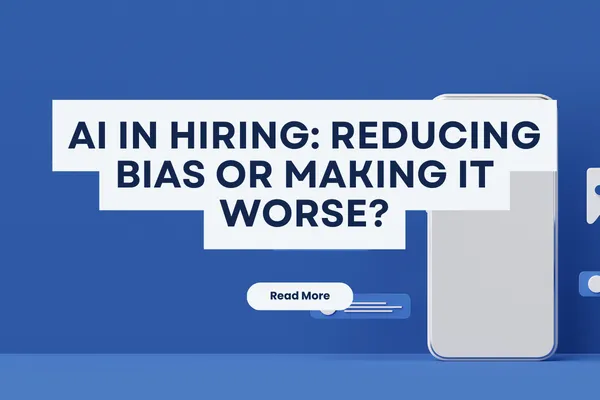Client Pro Blogs
Get Unlimited Leads With 'AI'
Download Our Free Ebook

AI In Hiring: Reducing Bias Or Making It Worse?
Introduction
Artificial Intelligence (AI) is a powerful tool that has changed the way we live, work, and even how we hire employees.
In today's digital world, many companies use AI to help them find the best candidates for job openings.
But there's a big question we need to ask: Is AI reducing bias in hiring, or is it making the problem worse?
In this thought leadership piece, we'll dive into the world of AI in hiring, exploring its potential to reduce bias, the challenges it faces, and the importance of using AI responsibly.
By the end, you'll have a better understanding of this critical issue and its impact on our job-seeking future.
The Promise of AI in Hiring:
Imagine a world where finding the perfect job was easier and fairer for everyone. That's the promise of AI in hiring. AI, or Artificial Intelligence, uses super-smart computer programs to help companies pick the best people for their jobs.
It does this by looking at lots of information about applicants, like their skills and experience, without caring about things like their gender or where they come from. This is a big deal because sometimes, when people hire others, they might accidentally like or dislike someone based on things that don't matter for the job.
AI can change all that by being totally focused on the stuff that's important for the job. It's like having a super helpful robot friend who makes sure everyone gets a fair shot at their dream job. So, the promise of AI in hiring is a world where everyone has a better chance to land the job they deserve, no matter who they are or where they come from.
Reducing Human Bias:
Bias occurs when people make judgments about others based on factors like race, gender, age, or background, rather than their actual qualifications and skills. This kind of bias can be unintentional, but it can still lead to unfair hiring decisions. That's where AI comes in as a potential solution.
AI systems are designed to focus solely on objective criteria when evaluating job candidates. They don't have the capacity for biases based on appearances or backgrounds. This means that AI can help level the playing field and provide everyone with a fair shot at job opportunities. By relying on data-driven assessments, AI can highlight the qualifications and skills that matter most for a particular job.
However, it's important to remember that AI isn't a magic wand that instantly eliminates bias. It's a tool created by humans, and it can inherit the biases present in the data it's trained on. To truly reduce bias, we must ensure that AI systems are trained on diverse and unbiased data. Additionally, regular monitoring and auditing of AI algorithms are essential to identify and rectify any potential biases that may arise.
In summary, reducing human bias in hiring is a critical goal, and AI has the potential to help us achieve it. But it's crucial to use AI responsibly, continually assess its performance, and take steps to ensure that it promotes fairness and equity in the hiring process.
Challenges and Concerns
As exciting as AI in hiring sounds, there are some important challenges and concerns that need to be addressed. One significant issue is the possibility of bias.
Even though AI is designed to be impartial, it can inadvertently learn bias from historical data. For instance, if past hiring decisions were biased against certain groups, AI systems might unknowingly continue this bias. This can lead to unfair treatment and exclusion of qualified candidates.
Transparency is another challenge. AI algorithms often operate as "black boxes," meaning it's hard to understand how they make decisions. This lack of transparency can make it difficult for companies to identify and rectify biases. It's crucial to ensure that AI systems are not making decisions based on factors like race, gender, or background.
Moreover, there are concerns about job displacement. As AI automates certain tasks in hiring, some worry that human recruiters may lose their jobs. Striking a balance between the advantages of AI and the importance of human judgment is a challenge for the future.
To overcome these challenges and harness the benefits of AI in hiring, companies must invest in responsible AI practices. This includes ensuring unbiased training data, regular audits, and transparent decision-making processes. By addressing these concerns head-on, we can create a future where AI in hiring truly benefits everyone..
The Importance of Responsible AI
Technology plays a massive role in our lives, including how we find jobs and build careers. AI, or Artificial Intelligence, is like a helpful assistant that can sort through vast amounts of information to help companies find the right people for the right jobs. But, like any tool, AI needs to be used responsibly to make sure it's working for the benefit of everyone.
Responsible AI means using it in a way that's fair and just. It's crucial because, without responsibility, AI could actually make some of the problems in hiring even worse. For example, if AI is trained on old data that has biases, it might repeat those unfair patterns when making hiring decisions. That's not what we want.
So, responsible AI means carefully selecting the information AI learns from and regularly checking to make sure it's making fair choices. It's like teaching a friend to be fair and kind to everyone. We have to make sure AI follows the same rules and values that we believe in as a society. By doing that, we can use AI as a tool to create a better and more equal job market for everyone.
Conclusion
AI in hiring has the potential to revolutionize the way we find and select job candidates, making the process more efficient and equitable.
However, it also comes with challenges and concerns related to bias and transparency. To harness the power of AI for good, it's essential that we use this technology responsibly, with a focus on reducing bias and promoting fairness in hiring.
The future of hiring may be driven by AI, but it's up to us to ensure that it's a future where everyone has an equal opportunity to succeed.
Let’s get you growing. Without the growing pains.
Let’s get you growing. Without the growing pains.
Contact Us
Easily Integrates With Leading Apps





About Client Pro
Culture
Compare Client Pro
Customer stories
Products
Features
All features
Appointments
Automation
CRM
Ecommerce & payments
Email marketing
Integrations
Landing pages & forms
Lead management
Reporting & analytics
Sales pipeline
Text marketing
Resources
Events
What is a CRM?
Lifecycle Automation
LCA Assessment
Free email templates
Subject Line Generator
How-to guides
Blog
Partners
Find a partner!
Apps & integrations
Help & Support
New customer resources
Customer Support
Help center!
Training Academy
Client Pro Marketplace
Play & template library!
Culture
Compare ClientPro
Customer stories
Contact us
Features
All features
Appointments
Automation
CRM
Email marketing
Text marketing
Sales Pipeline
Integrations
Payments & Invoicing
Websties & Landing pages
Lead management
Reporting & analytics
Products
Basic
Pro
AI Agent
Resources
Events
Automation
Free email templates
How-to guides
Blog
Help & Support
Customer Support
Help center
Client Pro Training Academy
Marketplace
Data migration
Coaching & guarantee
Product updates
Partners
Become a partner
Partner portal
Apps & integrations



